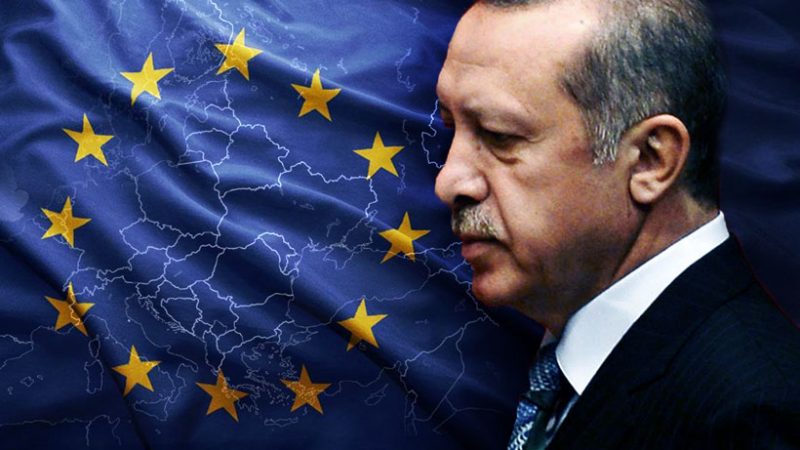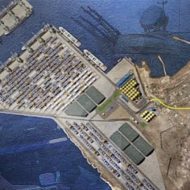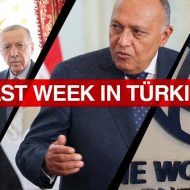When Washington unilaterally tore up the international nuclear agreement with Iran and re-imposed harsh sanctions on the country, Russia slammed this action as “trampling upon the norms of international law” and pledged continued support for multilateral diplomacy. Turkey also refused to comply with the sanctions, while Iran itself called for unity and encouraged Europe to act sovereignly. When the US declared economic war on Turkey and crashed the lira, Iran spoke up for Turkey, and Russia sent Lavrov to Ankara to re-coordinate operations in Syria and boost economic ties as Ankara counter-sanctioned the US. When Washington declared that it has two new sanctions packages for Russia, both Iran and Turkey denounced such unwarranted political-economic aggression as illegal.
In other words, as things stand, the US is rushing into a sanctions war, and those states that have fallen under sanctions and found themselves at the end of the American barrel are increasingly banding together in solidarity.
Now Europe has become a sanctions victim as well, with Trump re-launching the US’ economic offensive against the European Union by hiking tariffs, and continuing to threaten European businesses with sanctions for any (direct or indirect) deals with Iran. This comes despite the EU’s capitulation to what I discerned as a clearly unsustainable compromise, which Trump has now officially reneged by relaunching a 25% tariff raise on European automotive imports.
Thus arises an obvious question: will the EU and Turkey, as uneasy but longstanding partners currently both being “betrayed” and attacked by the US, realize that they are actually on the same side? While America seeks to extort its former allies as it strategically retreats to be “Made Great Again”, will Europe and Turkey make themselves great together?
In order to answer this increasingly relevant question, it is important to recall the historical nature of EU-Turkey relations. On a geopolitical level, Turkey’s path to EU accession was always hinged on the Washington-led and Brussels-processed Atlanticist project. The cornerstone of Turkey’s engagement with the Atlanticist project was, of course, NATO. As long as Turkey remained a loyal NATO member and furthered Atlanticist interests in Europe and the Middle East, on the one hand, and as long as Ankara strategically coordinated regional issues such as energy and migration with Brussels on the other, then the prospects of EU investment, the easing of travel restrictions, and other short-term material benefits of being a junior Atlanticist partner were dangled in front of Turkey, millions of whose citizens already live and work across Europe in demographically significant enclaves.
In the summer of 2016, the situation drastically changed when Atlanticist forces overplayed their hand, hedged their bets on the networks of US-based Fethullah Gülen, and attempted to overthrow President Erdogan, who had two weeks earlier initiated rapprochement with Russia following the historic resignation of the Atlanticist Ahmet Davutoglu from leading positions in Turkish policy-making. Desperate to halt Turkey’s foreign policy rectification and gravitation towards the Eurasian camp, the Atlanticists orchestrated a coup attempt which, in a testimony to the decline of NATO, utterly failed. Trying to alter fate, the Atlanticists yielded exactly the opposite of what they desired, as post-coup Erdogan’s Turkey has since gradually – albeit not without zig-zags and inertia – gravitated towards deeper cooperation with the Eurasian bloc in the foreign policy, economic, and military spheres.
The “trend of unilateralism and disrespect” towards Turkey of which Erdogan has accused Washington, has finally led to Erdogan doing precisely what he warned Turkey would have to do: “to look for new friends and allies.” It is curious to note that Erdogan’s rhetoric towards Washington has actually been considerably conciliatory. Whereas Ankara’s leader is more brazen in his language in disputes with the EU, his complaints to the US have taken the form of conciliatory pleas. For example, in his New York Times editorial, Erdogan painted a rosy picture of the US-Turkey alliance having “shed blood together”, implored the US not to put “our partnership” in “jeopardy”, and retold the story of the 2016 coup to American readers in a series of emotional invocations featuring September 11th, all the while carefully speaking as if the Gulenist coup had been run merely out of Pennsylvania, and not by Washington, allegedly with the fingerprints of General John F. Campbell himself. Erdogan’s denunciation of US sanctions as a “stab in the back” cleverly left Washington in a position to explain itself – which it has not done and is incapable of doing, for there is no “justification” for the US’ turn against Turkey besides the fact of the crisis of the US Empire, the collapse of the Atlanticist project, and Trump’s desperate moves to retreat from the latter and adjust American foreign and economic policies accordingly.
In effect, Erdogan has thus scored serious diplomatic points and set the media stage for Turkey to strategically re-orient its geopolitics. Erdogan will soon be on his way to a meeting with Putin and Rouhani in Iran in September, from which we can expect serious breakthroughs.
In other words, Turkey has exposed the US’ hypocrisy, and is now reasserting its sovereignty, buttressed by intensified cooperation with Russia, Iran, and China’s Eurasian multipolar project. Turkey’s resistance offers a stark point of comparison for Europe, which capitulated in the Juncker-Trump deal which is now in tatters in the US’ hands anyway.
The Western peninsula of Eurasia, stuck in the crisis of Atlanticism and the crisis of the present EU model, now has the opportunity to take Turkey’s cue and, what’s more, heal relations with its Turkish neighbor by leaving behind the ambitions and restrictions of the Atlanticist project which is now strangling both Europe and Turkey together.
The current situation and potential for EU-Turkish rapprochement is pertinent in two crucial spheres.
The first is ideology and the need for realism. The 2018 EU Commission report on Turkey revealed a contradiction: on the one hand, the EU condemned the 2016 coup, recognized that Turkey faces a “traumatic period” of repeated attacks of terrorism and destabilization, and “recognised Turkey’s legitimate need to take swift and proportionate action in the face of such a serious threat.” At the same time, however, the report criticized the Turkish executive’s corresponding measures based on concerns for “human and fundamental rights” and “serious backsliding on the freedom of expression.”
It is hard not to see this as an instance of the EU speaking the old language of liberal Atlanticism which even the US itself under Trump has been abandoning (despite the recent sanctioning of Turkish ministers for “human rights abuses” which, put into context, was clearly a pragmatic strike that is not in step with the Trump Administration’s otherwise realist rhetoric). The EU is regurgitating talk of “human rights issues” when we are in fact dealing with attempts at addressing subversive lobbies which a growing number of European states themselves are coming to recognize as problematic. These Atlanticist lobbies ostensibly represented by “human rights NGOs” and “opposition journalists” have increasingly been exposed to be what Joaquin Flores outrightly called “Foreign Government Organizations”, whose real raison d’État is destabilization, color revolution, cultural conflict, and the undermining of state sovereignty and the socio-political majority under the guise of “freedom of expression” for these externally nurtured minority lobbies. In our contemporary political reality, the curtailing of such “freedom of expression” more often than not means attempts by states to address the very real threats posed by these pro-Atlanticist and liberal lobbies which disproportionately dominate political discourse thanks to foreign funding, and whose “human rights concerns” have yielded the bloody realities of the “revolutions” that recently plunged the Middle East, North Africa, and the former Ukraine into chaos and war. After all, did these lobbies not show their true colors in attempting to violently overthrow the Turkish government?
The EU has the opportunity to amend and improve relations with Turkey on the basis of an appreciation of strategic interests. But it cannot do so as long as it clings to the discredited and pointless mythologizations of Atlanticist “human rights” and “democratic freedoms” which do not correspond to present political realities. Besides, the “curtailment of freedom of expression” and “political repression” are always relative issues related to the structure, nature, and circumstances of different countries – and unless the EU needs further reminders of its own track record of repression, it would be wise to realize that real “human and fundamental rights”, peace, and stability are inseparable from state sovereignty, which Turkey, like many other Eurasian countries, is trying to restore. The EU needs to accomplish the same task if it is going to survive the present transition period.
Rapprochement between Turkey and the EU, beyond the framework and discourse of the very Atlanticist project from which both are now only suffering, would be a major step towards the formulation of sovereign, strategic European interests.
Secondly, the EU and Turkey have the opportunity to expand their economic engagements with each other and thereby wither US sanctions. In 2017, Turkey was the fifth biggest importer of EU automobile products, and was the second biggest exporter of such to the EU, claiming 19% of the EU market. As the US raises tariffs against the EU’s automobile sector, increasing automobile industry trade with Turkey could help avoid the collapse of these multi-billion-euro markets. Ankara’s raising of tariffs on US cars by 120% is virtually a dog-whistle in this direction. Overall, Turkey remains the EU’s fourth largest export recipient and fifth largest provider of imports. The deepening of EU-Turkey economic ties would contribute to the alleviation of both actors’ dependency on the US’ economic whims, and would help lay the economic groundwork for realistic relations based on shared interests, rather than unsustainable ideological prejudices.
The above are but two of the many spheres that are ripe for an EU-Turkey rapprochement to counter the pressures of failing Atlanticism. In this context, the long march of the EU towards establishing sovereign apperception has one road sign pointing towards Ankara.
Europe and Turkey now have a window of opportunity to constructively cooperate against the US’ sanctions frenzy, and to reform their geopolitical apperception and political discourse in the process.









Leave a Reply